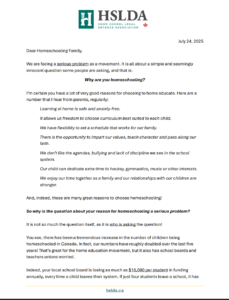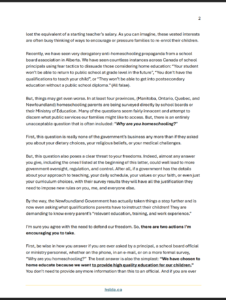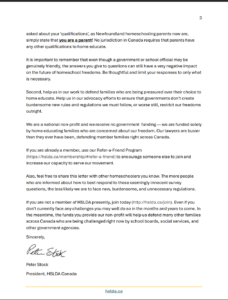Have a Question for Margaret Hatcher?
Margaret is ready to answer all your burning homeschool questions and share her chicken wisdom to help solve your schooling conundrums!
Want to ask Margaret your question? Fill out the form at the bottom of this page, and your question could be featured in the next installment of Hatcher’s Homeschool Confidential. Or reach out to contact@prairietideprojects.com directly.
Dear Margaret,
What’s the best way to answer “Why do you homeschool?” when it feels less like a question and more like an accusation?
“Why do you homeschool?”
It sounds like a simple question, and sometimes it is. But other times it’s not asked out of curiosity – it’s asked as a challenge.
Every homeschool family hears it. Most are excited to share their reasons – but how you answer can matter a lot. Especially now.
Legitimate Reasons to Homeschool
As a growing number of families have discovered, there are plenty of good reasons to homeschool, but a recent Letter from HSLDA1 (Home School Legal Defense Association) warns homeschool families that this question is being pushed in more jurisdictions as a ‘gotcha’ to justify imposing new rules on homeschooling and less as an academic exercise to learn where the public system might be falling short.
Why?
The assumption for why this question is asked is often that authorities are concerned about negative educational outcomes. But the data2 tells a different story: homeschool students routinely outperform provincial standards.
So what’s really going on?
As with most things, this is a numbers game. The more families leave the public system, the more school boards lose funding – up to $16,000 per student per year. That’s not pocket change considering the most recent data shows 54,738 students enrolled in homeschool across Canada in 2022/23 – an increase of 29% (or 16,392 students) from 2018/193.
Some jurisdictions (like Manitoba, Ontario, Quebec, and Newfoundland) are responding with legislative efforts to reclaim oversight, often framed as concern for students’ well-being and an interest in maintaining their ‘standards’. Others, like Alberta, are simply amping up the anti-homeschool rhetoric, telling parents they aren’t qualified, or that students won’t be able to get into postsecondary education. Both false.
Which brings us back to the question: how should you answer when the question feels like a trap?
It Depends on Who is Asking
If you ask any Johnny-on-the-street whether it would be appropriate for their elected officials to ask why they choose to be vegetarian or go camping every summer, the majority will say: absolutely not. That is none of their business.
And they’d be correct.
The government has no more right to ask a parent why they homeschool. The decision to homeschool is well within a parent’s rights and is guided by their family’s beliefs, values, and judgment.
But that doesn’t stop them from asking. So how does the HSLDA recommend you answer when “Why do you homeschool?” is asked in bad faith?
- Keep it simple.
Even though there are many benefits to homeschooling, the most universally legitimate reason is this: “We have chosen to home educate because we want to provide high-quality education for our children.” - Know your rights as a parent.
If someone asks about your qualifications, you can simply say: “I am a parent.” In Canada, that is sufficient legally and morally.
You don’t owe anyone more than that.



Good Reasons to Homeschool
Now that the LEGITIMATE reasons are dealt with, there are times when the question is sincere. Sometimes a fellow parent (or child) is truly interested but might not have encountered homeschoolers before, let alone considered the benefits!
This is where your answer can really matter. You could plant a seed and maybe even change a mind.
Homeschool doesn’t have a corporate PR team, no celebrity champions or corporate sponsors, so the general public may not be aware that homeschooling is an option, let alone a good one.
There are no better ambassadors for homeschooling than the parents and kids who do it every day.
So when you’re talking with someone who sees homeschooling as something for “kooks and outcasts,” a few A-tier talking points ready that reflect your values and experience can go a long way.
Some of Our Favorite Reasons to Homeschool
- Interest-led learning.
Children learn best when they are free to follow their interests at their own pace; whether that means moving faster or slower than the state curriculum, it doesn’t really matter. So long as they are interested, they are learning. - Real-world readiness.
Life is more diverse and unpredictable than a classroom can prepare kids for. Homeschooling lets them put their problem-solving skills to the test through real-world experiences. How great is that for building confidence? - Character over conformity.
The value of curiosity, critical thinking, and self-motivation are not always traits that flourish under rigid systems where all students are expected to direct their attention to the front of the class. - Flexible family lifestyle.
While establishing a routine is important to foster learning – each family has its own rhythms, values, or expectations and sometimes they don’t match the one-size-fits-all school calendar. Homeschooling allows you to design a schedule that reflects your life.
So whether you’re fielding suspicious questions from officials or engaging in a conversation with curious neighbors, remember this:
You don’t owe anyone an explanation – but if you give one, let it shine.
It’s a shame that parents do get challenged on this decision at all, so if and when you choose to engage: speak with the confidence that comes from knowing:
- you’re not alone,
- you’re not doing anything wrong
- you’re not underqualified
Be proud! Celebrate that you are doing something HARD – and deeply worthwhile – by taking full responsibility for the education of the WHOLE person you are raising: their body, spirit, AND MIND.
You are the parent. You are the teacher. And you are more than capable.
We at Hatcher’s Homeschool commend you. No matter what your reason.
Resources for Parents Who Want to Do This Well
You want to make thoughtful, informed choices for your family, so as we head into the 2025/26 unschool year, it helps to have strong resources in your corner that support your values and your child’s curiosity.
Here are two we highly recommend:
- Tuttle Twins Academy – Teach kids the importance of character, responsibility, and liberty with stories they’ll actually want to read, and lessons that will hold their attention.
Right now, their Lifetime Membership only $499 and books are up to 70% off – a rare deal we don’t expect to see again soon. Grab it here before it’s gone. - Ron Paul Curriculum – A self-paced K–12 program that emphasizes critical thinking, real-world skills, and personal responsibility. Perfect if you want your student to graduate with more than just memorized facts. Check out the Ron Paul Curriculum.
Both programs are created by people who believe in liberty, lifelong learning, and the power of parents. If you’re raising a student to think independently and act with integrity, these are definitely worth checking out.
Happy Learning!
- Source: Home School Legal Defense Association “Recommendation Letter July 2025” https://hslda.ca/PDF/HSLDA-Recommendations-Letter-July2025.pdf ↩︎
- Source: Canadian Centre for Home Education “Fifteen Years Later: Home-educated Canadian Adults, a synopsis” https://cche.ca/wp-content/uploads/2016/07/2009EnglishSynopsis.pdf ↩︎
- Source: StatsCanada “Number of home-schooled students in regular programs for youth, elementary, and secondary education” https://www150.statcan.gc.ca/t1/tbl1/en/tv.action?pid=3710017901 ↩︎
Who is Margaret Hatcher? Learn more about her, and the rest of the Free-Range Faculty at Hatcher’s Homeschool.
Have something you want to ask Margaret? Send us a message and your question might be featured in the next Hatcher’s Homeschool Confidential.
Disclosure: Prairie Tide Projects is an affiliate of the Tuttle Twins and Ron Paul Curriculum and may earn a commission if you make a purchase through affiliate links. This comes at no additional cost to you and we hope you find these recommendations helpful. Learn more on our Partners page.


